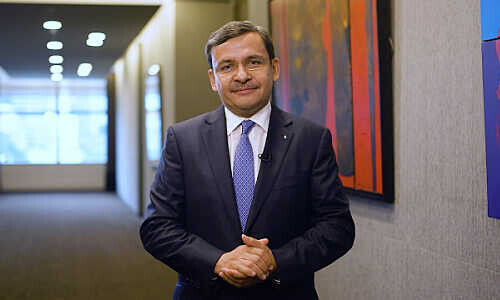Credit Suisse Maelstrom Engulfs Top Banker in Asia
The last man standing from the era of ex-CEO Tidjane Thiam, Credit Suisse’s Asia boss Helman Sitohang has sidestepped the bank’s scandals – until now.
Investment banker Helman Sitohang is the only top business executive promoted in Credit Suisse’s 2015 restructuring to survive until now – besides Thomas Gottstein, who inherited the CEO job from Tidjane Thiam 14 months ago.
After all, who better to lead the Swiss bank’s «one-bank» strategy of collaboration in Asia, the region where it is most fertile than Sitohang? The rainmaker with impeccable connections to Southeast Asia’s tycoons is credited with more than $200 billion in deals and capital-raising in 22 years at the Swiss bank.
While nobody at Credit Suisse comes out of the twin scandals of Archegos and Greensill looking good, Sitohang is particularly entrenched. He cited Asia’s holistic approach as «a strong source of growth for our business over the past three years» when Credit Suisse more closely tied in trading to private banking in 2019.
Embodiment «One-Bank»
Two years later, there is a renewed focus on the veteran Singaporean dealmaker. As the harsh reality of billion-dollar losses, lapses in risk management, conflicts of interest, regulatory scrutiny and shareholder ire sets in, it is clear that Credit Suisse's approach backfired.
Fifty-five-year-old Sitohang embodies the cross-selling strategy like no other top executive, but some of Credit Suisse’s biggest «one-bank» blunders happened on his watch: the bank called Luckin Coffee a dream client until it was found inflating sales.
Softbank Cash Confusion
He was a vocal backer of Lex Greensill, according to the «Financial Times» (behind paywall), didn’t want to damage the relationship when questions first arose in Zurich last year and spurred his team to find more clients like the Australian financier. And perhaps most damaging: Sitohang leads Credit Suisse’s relationship to Softbank.
The Swiss bank scrutinized the web of links, including a circular flow of money from the Japanese conglomerate last year. Softbank partly retreated, but the ties including a reported wealth management relationship with founder-CEO Masayoshi Son weren’t severed.
There is still confusion over why exactly a $400 million infusion by Softbank to Greensill meant to pay off Credit Suisse’s fund investors never made it to the Swiss bank, the «The Wall Street Journal» (behind paywall) reported last week. Sitohang hasn't yet been interviewed in the reviews of Greensill and Archegos being conducted by Credit Suisse's board.
Risk Tool Foundered
Sitohang is also attached to Credit Suisse’s risk lapses: the Asian arm started developing an exposure mapping tool, Risk 360, which won plaudits from Credit Suisse’s home regulator, the «FT» reported.
But despite plans to roll out the Asian project globally, it fell victim to bureaucracy and languished, the outlet reported. It isn’t clear whether «Risk 360» could have spotted or prevented the Greensill or other blow-ups, or how actively Sitohang lobbied for it in Zurich.
Back To Drawing Board
The business overseen by Sitohang enjoys wide-ranging freedom since being carved out in 2015: it managed nearly $22 billion in credit risk at year-end, compared to more than $32 billion for the international private bank.
To Sitohang’s credit, the Asian unit’s return on regulatory capital exceeded 20 percent both last year and in 2019. As Credit Suisse goes back to the drawing board, incoming Chairman António Horta-Osório is likely to second-guess the structure – and Sitohang as well?




























